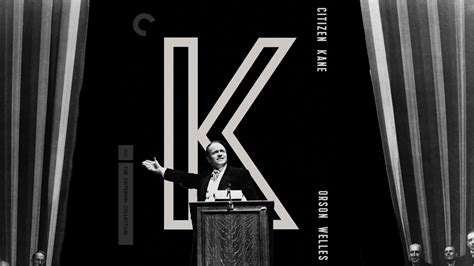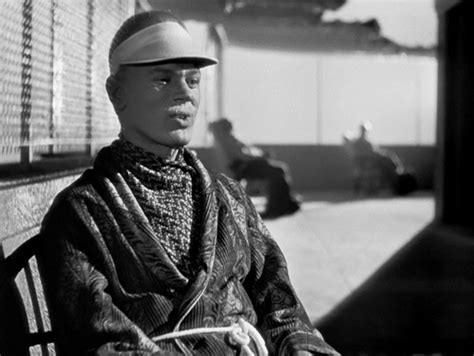
Movie: Citizen Kane: The More You Tally the Smaller the Sum…-or -You Can Never Go Home Again, Even If You’re Stinkin’ Rich
The addition of Potassium to the periodic table would spark a paranoid political firestorm unseen since Ytterbium led to the 1914 invasion of Haiti.
Orson Wells made a habit of thinking way above his pay grade, at sixteen, he convinced a famous Irish Theater Group that he was an American Wunderkind there to bestow his artistic riches on the poor sons of Erin-and they bought it! The kid had, like, one year of high school drama under his belt and all of a sudden, with hustler balls and American spine, he’s walking the boards professionally doing Shakespeare and Chekov.
He comes back to the States and now convinces Hollywood he’s some great Irish-American stage actor ready to bestow his artistic gifts on the artless masters of the barbaric form: cinema-and they bought it.
At twenty-four they let this kid make a major motion picture that nearly matched D.W. Griffith for innovation of visual language and, like a novel, points to one effect, one singular lesson, a solitary image, one heart-rending truth. Did I mention he played the title character in every stage of life? It was so convincing you could swear the twenty-something bastard had bursitis.
Charles Foster Kane was Wells’ stand-in for a titan from his own youth, William Randolf Hearst, the publishing magnate and son of murderous gold miner and claim jumper yada-yada-yada-Hearst (don’t believe me? watch Deadwood.) The story focuses on a journalist’s search for the meaning of Kane’s last word, a cryptic yawn from the depths of his soul–which is strange because they heard he sold it for an exclusive with Shoeless Joe Jackson (It was a very common practice in those days, they used to say if you aren’t prepared to suffer Sheol, Domain of Sinners Slain Where Even the Light is as Darkness…don’t go into the news business-it’s the newsman’s credo. Fun Fact: It’s also the epitaph of Jimmy Breslin).
Well, he didn’t, come to find out before he was the picture of twisted American industry he had wholesome American life, though dirt poor, in flashback we meet Kane as a boy and see him sledding down a hill behind his parent’s house, when he arrives at the bottom he sees a fancy car out front-What’s this? A guest for dinner? But we only have one turnip. Aw, shucks, I don’t need seconds anyway-that car belonged to a rich man who wanted a son and heir, if his shivering parents-the ones holding the turnip tightly to their chest-are agreeable, the boy would live a privileged life of wealth and access, his problems would be forever erased. Happiness, though never destined for his parents, may yet bestow upon their son, also there would be a 33% increase in turnip, which is nothing to scoff at-what a fantastically fortuitous and creepy story. The film propels us forward, Kane’s a dandy, kicked out of every Ivy League institution and about to begin his career managing that faceless old man’s publishing empire.
Time wears on. He becomes old. Chases women. Marries a talent-less singer. He builds her an opera house. He divorces her. He runs for President. In all of it he accumulates the trappings of wealth and decadence, even naming his house Xanadu, from the poem, you remember it: “Once, in Xanadu, did Kubla Khan make a stately pleasure dome decree…” Priceless works of art, everything a boy, a man, a sour codger who patrols the checkerboard floor of his palace in yearning solitude…could ever want! It’s Horatio Alger, it’s Little Orphan Annie! Right? I mean, Right?
Rosebud.
-Say again, Chief?
Rosebud.
‘Bone’s Blood’? That’s a Scottish soup, kinda like black broth, my cousin had it at his wedding, why are you-Oh Christ, he’s dead!
Richest man in the world, could slap the Pope like a ten-penny prostitute and get away with it, and his last word was ‘Rosebud’?

“Course I know what he meant. There was a prostitute he was most fond of, half her leg was gone when it was snatched off in a tractor-accident when she was twelve. Her name was Roseb–wait, no. Um, her name was Barbara. Shit. OH, I REMEMBER it was -no, that was Gene Tunney. Who the hell was Rosebud? Getting old sucks , man.”
Nobody knew what it meant, everyone from his past was interviewed but none knew for sure, all they could verify is that he’d said it twice, when his wife left him and at his death. We are left to agree that it meant nothing, that he invented the word to add drama to his passing, he’d done it his whole life, the man only printed the truth when he had to, everything was an above-the-fold feature for him to manipulate, even the story surrounding his end, using a literary device to anchor it in the public’s mind. That was pure Kane. If so, it was a gift to his enemies, it was as if he wanted all of his competitors’ newspapers to run the same headline:
Horrid Inventor of Salacious Sap Lies Even in Death
Then. The “Memorable Scene”. I debated with myself whether or not to spoil the ending. By Hermes Wing-ed Heel the movie is 80 years old! Why am I treating it like it was released last Tuesday? (Also in breaking news: Japan Surrenders! Nation Celebrates End to Long Ordeal of Eating Cheeseburgers Only Six Days A Week, Meanwhile, In England, A Vicar Wrestles a Baby for a Carrot Stub!).
I don’t think it matters how old the picture is, just the thought of stealing the impact of the final scene from even one person makes me cringe, it would be a real tangible wrong not to serve it the way Orson cooked it, the way I experienced it, so I won’t. We are eventually introduced to Rosebud, in the very last scene as people weave in and out of his resplendently palatial home, his ‘pleasure dome’, his Xanadu, which held a storehouse of artistic treasure on which they would bid this last day the house was open, because of this there was a pile of junk being burnt in the great fireplace, but these perceptive art lovers passed it and wandered, dazzled by his marvelous taste and the mystery of his last word. That’s when we meet Rosebud and the true horror of the moment is when we realize that we, the mute, voiceless audience, are the only ones who know the secret to this man’s life.
His friends and lovers, whether they hate him or still-kinda-liked him, will never truly know the man, not like us, who saw what can’t be unseen. We are, in a way, in that crypt with Kane: mute, voiceless, though informed now unable to explain his agony…forever. Only us. Only we. And credits roll.
(Just so I can live with myself, I have encoded the identity of Rosebud within this article, it’s right in front of your eyes, you just have to be keen [..and have a functional understanding of basic cryptography] To be sporting, I can give hints: it’s between 7 and 11 letters, it’s more than one word, it has two vowels, neither vowel is at the beginning or end of a word and no word is a verb-there, I’ve technically fulfilled my duty to the masthead, I have given you the answer to Kane’s riddle, the Memorable Scene, the final scene before credits roll-but I’ve done so without doing so, because to describe the Memorable Scene is to rob the reader-but I ask that if you haven’t seen Citizen Kane don’t play my little game, in cinema as in sausage, it’s best not to know what’s in it to get any pleasure out of it, and for those of you who have seen it but still can’t find the code embedded in this article-choke on it, that’s all the clues I’m giving you.)